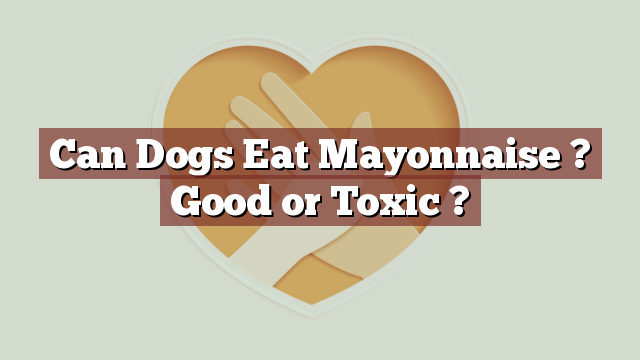Can Dogs Eat Mayonnaise? Good or Toxic?
As responsible pet owners, it is crucial to be aware of what foods are safe for our furry friends. One common food item found in many households is mayonnaise. However, when it comes to dogs, can they safely consume this creamy condiment? In this article, we will explore the nutritional value of mayonnaise, discuss its safety and potential toxicity for dogs, evaluate the risks and benefits of dogs consuming mayonnaise, and provide guidance on what to do if your dog happens to eat it.
Nutritional Value of Mayonnaise: What Does it Contain?
Mayonnaise is typically made from a mixture of oil, egg yolks, vinegar or lemon juice, and seasonings. This creamy spread is high in fat and calories, providing a rich source of energy. Additionally, it contains vitamins E and K, as well as small amounts of other essential nutrients. However, it is important to note that mayonnaise is also high in sodium, which can be detrimental to dogs in large quantities.
Can Dogs Eat Mayonnaise? Safety and Toxicity Explained
No, dogs should not consume mayonnaise. While mayonnaise itself is not toxic to dogs, it is not considered a healthy or safe option for them. The high fat content in mayonnaise can lead to digestive issues such as pancreatitis or obesity in dogs. Moreover, the excess sodium in mayonnaise can contribute to an increased risk of dehydration and other health problems. It is best to avoid feeding mayonnaise to your canine companion.
Potential Risks and Benefits of Dogs Consuming Mayonnaise
The potential risks of dogs consuming mayonnaise outweigh any potential benefits. The high fat content can put a strain on the dog’s digestive system and contribute to weight gain and obesity. Furthermore, the excess sodium content can lead to sodium toxicity, which can cause symptoms like excessive thirst, vomiting, diarrhea, and even seizures in severe cases. Therefore, it is advisable to keep mayonnaise away from your dog’s diet to prevent these health issues.
What to Do if Your Dog Eats Mayonnaise: Steps to Take
If your dog accidentally consumes mayonnaise, it is essential to monitor their behavior and look out for any signs of discomfort or illness. If your dog exhibits symptoms such as vomiting, diarrhea, abdominal pain, or dehydration, it is crucial to seek veterinary assistance immediately. Make sure to provide your veterinarian with information about the quantity and ingredients of the mayonnaise ingested, as this will aid in their evaluation and treatment plan.
Conclusion: Mayonnaise in Moderation for Dogs
In conclusion, mayonnaise is not a safe or healthy food option for dogs. The high fat and sodium content can lead to various health issues, including digestive problems and sodium toxicity. It is best to avoid feeding mayonnaise to your canine companion altogether. If your dog accidentally consumes mayonnaise, keep a close eye on their condition and consult a veterinarian if any adverse symptoms occur. As responsible pet owners, it is important to prioritize the well-being and health of our beloved dogs by providing them with a balanced and appropriate diet.
Thank you for investing your time in exploring [page_title] on Can-Eat.org. Our goal is to provide readers like you with thorough and reliable information about various dietary topics. Each article, including [page_title], stems from diligent research and a passion for understanding the nuances of our food choices. We believe that knowledge is a vital step towards making informed and healthy decisions. However, while "[page_title]" sheds light on its specific topic, it's crucial to remember that everyone's body reacts differently to foods and dietary changes. What might be beneficial for one person could have different effects on another. Before you consider integrating suggestions or insights from "[page_title]" into your diet, it's always wise to consult with a nutritionist or healthcare professional. Their specialized knowledge ensures that you're making choices best suited to your individual health needs. As you navigate [page_title], be mindful of potential allergies, intolerances, or unique dietary requirements you may have. No singular article can capture the vast diversity of human health, and individualized guidance is invaluable. The content provided in [page_title] serves as a general guide. It is not, by any means, a substitute for personalized medical or nutritional advice. Your health should always be the top priority, and professional guidance is the best path forward. In your journey towards a balanced and nutritious lifestyle, we hope that [page_title] serves as a helpful stepping stone. Remember, informed decisions lead to healthier outcomes. Thank you for trusting Can-Eat.org. Continue exploring, learning, and prioritizing your health. Cheers to a well-informed and healthier future!

